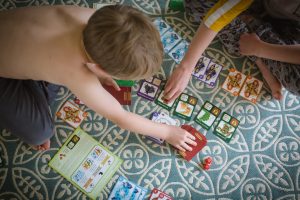Considering Homeschooling?
Original guide article written by Ann Clay
Homeschooling is not for everyone, but it is for anyone.
No matter your race, religion, political affiliation, income level, or family situation, there are homeschoolers like you.

Contrary to stereotypes in the media, homeschoolers are incredibly diverse in educational style and philosophy. They come from all socio-economic levels. Their religious beliefs and political affiliations span a wide spectrum. However, they hold these beliefs in common:
- Institutions are not the best educational option for many children, and should not be the only available choice.
- Parents have the right to choose the method of education for each of their children.
Ask five families why they homeschool, and you will get five different replies. Many would choose to homeschool no matter what changes were made in the school system, because they believe the family home provides the best possible learning environment for their growing children. Others would put their children in school if the school systems would make changes to their liking. Some families even homeschool one child while another attends school, because different children have different needs.
VaHomeschoolers provides Virginia families with information and support to help them decide if homeschooling will work for their situation.
Homeschooling Approaches
In essence, homeschooling happens when families take on the primary responsibility for their children’s educations, using their existing roles to guide the progress of their children. Homeschooling may look different in different families. Some parents might prefer a structured, “school-at-home” approach, while others may prefer a lifestyle in which learning is integrated seamlessly with daily activities; many families will choose something in between. In almost all homeschooling families, the approach will change from one year—or even one day—to another.
Family-centered education offers great flexibility and variety. Learning happens in kitchens, spare rooms, cars, classrooms, art and dance studios, science labs, college campuses, campers, libraries, theatres, forests, airplanes, and in conversing with family and friends. Many parents use supplemental activities and supplies, such as sending their children to outside lessons, making use of the library, using pre-packaged curricula, going on field trips and taking advantage of less-traveled times of the year to explore the world.
Homeschooling is home-based learning that provides an education customized to suit your child and family. It does not have to look just like school, taught at home; nor do you have to follow a typical school schedule. Homeschooling affords a family the chance to ensure that children are taught in the manner in which they learn best, offering a lot of freedom in guiding your child’s education. More than just an educational choice, homeschooling typically represents a lifestyle choice for families.
In crafting a lifestyle, homeschoolers have the opportunity to:
- spend more time together as a family.
- live a more relaxed lifestyle by setting their own schedules in accordance with values, personalities and goals.
- travel more, especially at less expensive and less crowded off-peak times.
- celebrate religious and special family days.
- spend time outdoors and in the community.
- explore their passions.
- spend more time learning life skills, such as cooking, gardening, managing money, car repair and using technology.
In terms of academic pursuits, homeschooled children have the opportunity to:
- learn subjects not usually taught in schools.
- learn at their own pace, more advanced in some subjects and less advanced in others.
- take field trips when desired, to enrich learning.
- have time for more in-depth study.
- be introduced to new concepts when they have reached an appropriate developmental stage.
- have uninterrupted blocks of time long enough to be able to engage in sophisticated, complex activities and thought processes.
- develop the ability to pace themselves.
- learn in a manner suited for their own particular learning style.
- work for internal satisfaction rather than external rewards, learning to judge the quality of their work.
- seek out assistance from many alternative sources, rather than relying on a classroom teacher to provide all the answers.
With respect to socialization, homeschoolers may:
- expand their social interactions beyond a classroom of children who are the same age and from the same school precinct.
- volunteer in the community as part of a regular schedule.
- develop stronger bonds with siblings, parents, extended family and close friends by spending time together playing, working, and helping each other.
- experience less peer pressure to grow up quickly in terms of clothing styles, music, language and interests in adult activities.
- be comfortable in being “different” with minimized risk of being bullied.
- learn family values by seeing and participating in parents’ daily lives.
Homeschooled children may get a headstart preparing for their futures, including higher education and employment, by:
- exploring their passions and vocational interests at an early age.
- undertaking internships/apprenticeships at a much younger age than is possible within the school system.
- being employed during the school day–in Virginia, at the age of 16.
The economics of homeschooling can be challenging for some, but they aren’t insurmountable. Many homeschooling families are already living on one (or in some other way reduced) income in order for one parent to spend more time at home. Some families find they have a richer, more fulfilling lifestyle with a smaller house, less ‘stuff,’ and more time together. Remember, it is possible to work and manage your children’s education.
Beginning homeschoolers run the risk of buying unnecessary, inappropriate or overly expensive curriculum. Be prepared to take time finding the right materials, and be ready to switch until you find the curriculum that suits your child’s learning style. Get your feet wet with homeschooling before making any big purchases. Resist the false assurance of an expensive, professionally-created curriculum package at the beginning. We’ve all been there, and most of us have shelves full of unused materials to prove it.
There is no one ‘right’ way to homeschool; many families do a great job with just a library card and internet access. Check your local library, used book stores, look for used materials online or at VaHomeschoolers’ annual Used Resource Sale, and connect with local homeschoolers and ask to look at the materials on their shelves before purchasing.
Another thing to consider is that if one parent takes the lead in managing the homeschooling, the other parent must recognize that this role is a major investment of time and effort. An adjustment of expectations may be necessary. For example, if one parent stops working (for money) in order to facilitate homeschooling, the other parent must remember that the household has not just gained a full-time maid.
If finances are of concern to you, please refer to the Costs of Homeschooling, an article from VaHomeschoolers Voice magazine.
Yes, homeschooling is legal in all 50 states. Each state has its own laws regarding homeschooling, and the legal requirements vary widely across the country.
Click here for an overview of the homeschooling-related laws in Virginia.
There is no one way to homeschool! Visit our page on Styles and Approaches for an overview of some popular methods, but many homeschoolers mix-and-match approaches in ways that work best for their own families.
No, you can begin to homeschool at any time.
Others in your situation have homeschooled with help.
Read all about the different ways to comply with (or to be considered exempt from) the compulsory attendance code in Virginia. Most homeschoolers, however, homeschool under the home instruction statute.

Homeschoolers are in the real world.
Homeschoolers are active in their communities — taking classes, volunteering, playing sports, working, overcoming challenges, and hanging with friends.
Homeschoolers aren’t stereotypes.
The one homeschooler you’ve met or heard about (good or bad) isn’t like the other 40,000 homeschoolers in Virginia, in the same way that one public school kid doesn’t represent all school kids.


Homeschoolers are your neighbors.
We’re parents and caregivers who work as teachers, artists, doctors, homemakers, professors, social workers, scientists, pastors, tradespersons, farmers, managers, business owners, youth coaches and more.
Homeschooling is growing!
Over the past decade, homeschooling in Virginia increased over 50%. More than 65,000 kids are now being homeschooled in the Commonwealth. In fact, if homeschoolers were considered a school division, they’d be the 5th largest district in the state.

“… But can I really do this?”
Most homeschoolers ask this question. That question means you are a caring, responsible parent, wanting to make sure you are truly doing what is best for your child. The answer comes with trying and then periodically refining how you homeschool. It may take several attempts to find the right approach for your child’s learning style. There may be a period of transition as parent and child adjust to spending more time together. You may have to figure out a way to ensure personal time or to be creative with finances. It could involve visiting several different homeschool groups or co-ops till you find the one right for your family. Most homeschoolers find they need support handling the feeling of greater responsibility, dealing with periodic burnout, and the one we all share: “Am I doing it right?”
VaHomeschoolers can help! See the ways VaHomeschoolers can provide support and connections, so that you can benefit from the experience of the homeschooling community. All of us have had these questions during our homeschooling experience, and by communicating with each other, we not only find support but enjoy the homeschooling adventure.
This information is provided as a courtesy of The Organization of Virginia Homeschoolers. It is not intended as legal advice. For legal advice, contact a licensed attorney.
VaHomeschoolers is a non-profit public charity with 501(c)(3) status; your donation is tax-deductible to the extent provided by law.
